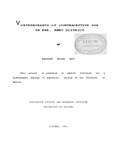| dc.description.abstract | The study examines how certain demographic, socio-cultural, socia-economic, and accessibility factors affect contraceptive use among a cohort of married women age 25-34 years in Ena, Embu district.
The objective of the study is based on the fact that the level of family planning in this area is relatively higher than in any rural area in the country.There is therefore need to examine what has contributed to this high contraceptive prevalence.
The study uses secondary data collected in a survey carried out by the GTZ family planning support unit, Division of family health between November, 1990 and March
1991. Samples of :3:38 women were covered in this survey.
From the analysis of this data, the following are the
main findings:
a) Around 77 .1.% women in Ena had discussed family planning with their husbands and 71.0% thought, their husbands approved of family planning.
b) At the time of the interview around 51.0% were users.
c) Knowledge of contraceptive methods was good with an average of over three methods cited but level of use was comparatively low
d) Information about family planning and adoption of
methods are predominantly the result of face to face
passing of information by Health personnel at clinics. No other source of information was significant.
e) Traveling time was found to be negatively related to contraceptive use. The closer a woman was to source of family planning services, the more likely she is to be a user.
f) Religion, age of woman, ethnicity and number of
surviving children were found to have an influence on contraceptive use.
Finally husbands discussion on family planning, his
approval and attitude toward family planning had a
significant association with contraceptive use.
study the following recommendations were made:
a) Changing aspects of family planning delivery must be looked into. For clinic services, family planning providers should.be properly trained on client-worker relationship. The problem of barriers to access should be minimized by creation of more service delivery points and out reach.
b) Information, Education and Communication is very
important to change men's attitudes towards family planning.
c) Population Education should be taught to both girls and boys in schools and men less than 30 years.
d) Further research carried out to investigate reasons for non-use of service sources.
e) Policy makers should link interventions with societal transformations, and should be implemented from parental involvement and understanding. | en |

